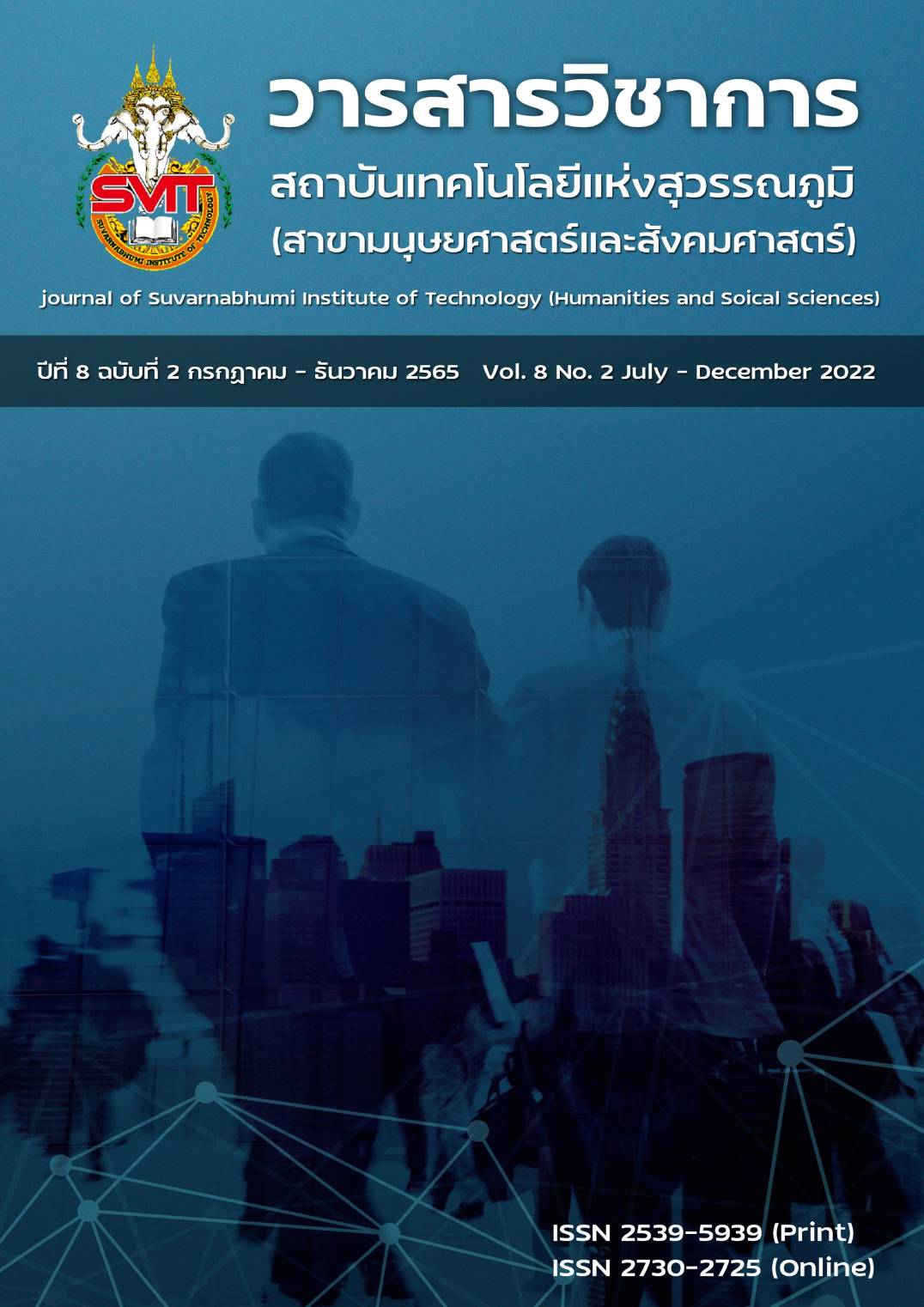DEVELOPMENT THE DIGITAL SKILLS OF HUMAN RESOURCES FOR GOVERNMENT ORGANIZATIONS TO SMART CITY OF CHACHOENGSAO PROVINCE
Keywords:
Digital skills, Human resources, Smart cityAbstract
This research aims to study the guidelines for developing the digital skills of human resources for government organizations to smart cities of Chachoengsao Province. This research uses a qualitative research methodology. Using in-depth interview methods and focus group discussion, Use a semi-structured interview form with key informants. which selected a specific sample group from executives and practitioners of Chachoengsao provincial government organizations, Community leaders, Academics and professors in sociology, totaling 28 peoples to use the data to analyze the results in a descriptive manner. The results showed that guidelines for developing the digital skills of human resources for government organizations to smart city in Chachoengsao Province consist of 5 dimensions: 1) Knowledge and use of technology as personnel should have skills, knowledge, and understanding of the digital technology usage and be able to perform basic maintenance correctly. 2) Skills in understanding legal policies and standards. The personnel should have the skills to learn about the practices in the digital society. and the Personal Data Protection Act (PDPA) for legal use. 3) Digital skills for application and development. Personnel should have skills in applying digital technology to work together both within the agency and in public services outside the agency. 4) Skills in using digital technology for planning, managing and leading the organization. Personnel should have digital skills based on their competency in each position and in line with the organization's strategic plan, and 5) Skills in using digital to drive change and creativity. Personnel should have the skills to digitize their work patterns to create innovations. as well as being able to effectively transmit digital usage to the people who receive services
References
กตัญญู กลับสุวรรณ์. (2561). การบริหารเมืองอัจฉริยะแบบเสมือนจริงร่วมกับความมั่นคง ปลอดภัยแห่งชาติแบบครบวงจรเพื่อนำประเทศก้าวสู่ไทยแลนด์ 4.0. เอกสารวิจัยส่วนบุคคล. วิทยาลัยป้องกันราชอาณาจักร.
กรมสุขภาพจิต. (2563). เกณฑ์การจัดแบ่งช่วงอายุ. สืบค้นเมื่อ 1 พฤษภาคม 2563, จาก https://www.dmh.go.th/news/view.asp?id=1251
กระทรวงดิจิทัลเพื่อเศรษฐกิจและสังคม. (2560). แผนแม่บทการพัฒนาเมืองอัจฉริยะ. สืบค้นเมื่อ 5 มกราคม 2565 จาก https://goo.gl/F8LLFX.
กิตติพงศ์ กมลธรรมวงศ์. (2563). ประสบการณ์ของกฎหมายคุ้มครองข้อมูลส่วนบุคคลในประเทศสาธารณรัฐสิงคโปร์: บทเรียนสำหรับประเทศไทย. วารสารสังคมวิจัยและพัฒนา, 2(2), 7-29.
จารุวรรณ ประวันเน. (2563). กระบวนการเปลี่ยนแปลงสู่การเป็นเมืองอัจฉริยะ: กรณีศึกษาเทศบาลนคร ขอนแก่น. Local Administration Journal, 13(3), 267-284.
เจนณรงค์ พันธุ์จันทึก. (2562). การพัฒนาเมืองขอนแก่นให้เป็นเมืองอัจฉริยะ: พัฒนาการและความก้าวหน้า. การประชุมวิชาการระดับชาติ ด้านการบริหารกิจการสาธารณะยุคดิจิทัล ครั้งที่ 5 วันที่ 1-2 พฤศจิกายน 2562, วิทยาลัยการปกครองท้องถิ่น มหาวิทยาลัยขอนแก่น.
ชลิตพันธ์ บุญมีสุวรรณ. (2563). นวัตกรรมและการปรับตัวของธุรกิจในยุคดิจิทัล. วารสารธุรกิจปริทัศน์, 12(2), 236-246.
ชัยรัตน์ ชามพูนท. (2564). การพัฒนาทรัพยากรมนุษย์ในยุคการเปลี่ยนแปลงฉับพลันทางดิจิทัล. วารสาร ครุ ศาสตร์ปริทรรศน์, 8(1), 195-208.
ชิดชนก ชูนุช. (2562). การพัฒนาบุคลากรในสังกัดสถาบันพัฒนาข้าราชการกรุงเทพมหานคร. (วิทยานิพนธ์ปริญญารัฐประศาสนศาสตรมหาบัณฑิต, มหาวิทยาลัยรามคำแหง). กรุงเทพฯ.
ณภัทช์ฐนัน ศักดิ์เจริญกุล. (2562). การเตรียมความพร้อมของบุคลากรภาครัฐไทยสู่การเป็นรัฐบาลดิจิทัล. (วิทยานิพนธ์รัฐประศาสนศาสตรมหาบัณฑิต, จุฬาลงกรณ์มหาวิทยาลัย). กรุงเทพฯ.
ดวงสมร สุทธิวงศ์กูล. (2562). การพัฒนาทักษะดิจิทัลของบุคลากรภาครัฐไทยสู่การเป็นรัฐบาลดิจิทัล. วารสารการเมือง การบริหาร และกฎหมาย, 13(1), 197-216.
เนตรชนก ดวนใหญ่. (2562). การพัฒนาศักยภาพของบุคลากรในศาลอาญายุคดิจิทัล ประจำปี 2562. (การค้นคว้าอิสระรัฐศาสตรมหาบัณฑิต, มหาวิทยาลัยรามคำแหง). สืบค้นเมื่อ 29 ตุลาคม 2563, จาก https://esv-jti.coj.go.th/Thesis/deteil/Master’s/2563/ma_63_006.pdf
บุษกร เชี่ยวจินดากานต์. (2561). เทคนิคการวิจัยเชิงคุณภาพแบบกรณีศึกษา. วารสารศิลปศาสตร์ปริทัศน์, 13(25), 103-118.
ประธาน คำจินะ. (2562). การบูรณาการเทคโนโลยีสารสนเทศเพื่อการพัฒนาต้นแบบเมืองอัจฉริยะ กรณีศึกษาพื้นที่เทศบาลเมืองเมืองแกนพัฒนา จังหวัดเชียงใหม่. รายงานวิจัยฉบับสมบูรณ์, มหาวิทยาลัยราชภัฏเชียงใหม่.
พงษ์วัตร บุญสนองโชคยิ่ง. (2563). การพัฒนาทักษะด้านดิจิทัลเพื่อรองรับการเปลี่ยนแปลงสู่องค์กร ดิจิทัลของบุคลากรสำนักงานเลขานุการ สำนักการแพทย์ กรุงเทพมหานคร. (การค้นคว้าอิสระรัฐประศาสนศาสตรมหาบัณฑิต, มหาวิทยาลัยรามคำแหง).
พัชรินทร์ คณิตชรางกูร. (2560). การพัฒนาทรัพยากรมนุษย์ของสำนักงานทหารพัฒนาหน่วยบัญชาการทหารพัฒนา กองบัญชาการกองทัพไทย เพื่อรองรับการเปลี่ยนแปลงสู่ยุคไทยแลนด์ 4.0. (การค้นคว้าอิสระ รัฐศาสตรมหาบัณฑิต, มหาวิทยาลัยธรรมศาสตร์). สืบค้นเมื่อ 29 ตุลาคม 2563, จาก http://ethesisarchive.library.tu.ac.th/thesis/2017/TU_2017_5903010352_8089.pdf
พิชญ์สินี มะโน. (2562). ผลกระทบจากการเปลี่ยนแปลงในยุค Digital Disruption ต่อการศึกษา. วารสาร ครุศาสตร์อุตสาหกรรม. 18(1), 1-6.
พิมพ์นิภา บัวแสง. (2560). Digital: Transformation พลิกโฉมธุรกิจด้วยแนวคิดดิจิทัล. การเงินธนาคาร เกร็ด การเงิน, ธันวาคม 2560.
ภัทร พจน์พานิช. (2561). การพัฒนาทรัพยากรมนุษย์ภายใต้นโยบายประเทศไทย 4.0. รายงานการวิจัย. วิทยาลัยป้องกันราชอาณาจักร.
ภาภรณ์ เรืองวิชา. (2563). การพัฒนาเมืองอัจฉริยะ: บทเรียนจากต่างแดนสู่ข้อเสนอแนะต่อประเทศไทย. วารสารการบริหารนิติบุคคลและนวัตกรรมท้องถิ่น, 6(4), 165-180.
รุ่งนภา จันทร์อ่อน. (2562). การพัฒนาทักษะด้านดิจิทัลของบุคลากรกรมประชาสัมพันธ์สู่การเปลี่ยนเป็น หน่วยงานดิจิทัล. (การค้นคว้าอิสระ รัฐประศาสนศาสตรมหาบัณฑิต, มหาวิทยาลัยรามคำแหง). กรุงเทพฯ.
วัชรพจน์ ทรัพย์สงวนบุญ. (2563). การเปลี่ยนผ่านทางดิจิทัลขององค์กรภาครัฐเพื่อยกระดับความสามารถ แข่งขันของประเทศไทย. วารสารการจัดการสมัยใหม่, 18(1), 15-22.
สถาบันพัฒนาบุคลากรดิจิทัลภาครัฐ. (2564). กรอบมาตรฐานหลักสูตรทักษะดิจิทัลสำหรับข้าราชการและบุคลากรภาครัฐ. สืบค้นเมื่อ 18 มีนาคม 2564 จาก https://dgsc.dga.or.th/home/about_us
สมศักดิ์ วานิชยาภรณ์. (2564). การพัฒนาทักษะดานดิจิทัลกับการทํางานในยุคชีวิตวิถีใหม (New Normal). การประชุมวิชาการระดับชาติครั้งที่ 13 มหาวิทยาลัยราชภัฏนครปฐม วันที่ 8-9 กรกฎาคม 2564. สืบค้นเมื่อ 2 กันยายน 2564 จาก https://publication.npru.ac.th/bitstream/123456789/1492/1/npru_237.pdf
สำนักงานส่งเสริมเศรษฐกิจดิจิทัล. (2563). แผนส่งเสริมการพัฒนาเมืองอัจฉริยะ. สืบค้นเมื่อ 10 มีนาคม 2564 จาก https://www.depa.or.th/th/smart-city-plan
สำนักงานส่งเสริมเศรษฐกิจดิจิทัล. (2565). แผนแม่บทการส่งเสริมเศรษฐกิจดิจิทัล พ.ศ.2561-2565. สืบค้นเมื่อ 5 มกราคม 2565 จาก https://www.depa.or.th/th/master-plan-digital- economy/1st-master-plan-for-digital-economy
อัครวินท์ ศาสนพิทักษ์. (2564). การสังเคราะห์บทบาทเมืองอัจฉริยะที่มีผลต่อการลดความเหลื่อมล้ำทางสังคม: การสังเคราะห์อภิมาน. วารสารรัฐศาสตร์และรัฐประศาสนศาสตร์, 12(1), 7-28.
Adapa, S. (2018). Indian Smart Cities and Cleaner Production Initiatives-Integrated Framework and Recommendations. Journal of Cleaner Production, 172, 3351-3366.
EECO. (2562). ฉะเชิงเทรา เมืองใหม่สำหรับการอยู่อาศัยในพื้นที่ EEC. สืบค้นเมื่อ 2 มีนาคม 2564, จาก https://www.baania.com/th/article/
Elisa, C., & Paola, N. (2019). Digital Skills and Profile of Each Generation: A Review. International Journal of Developmental and Educational Psychology, 3(1), 487-496.
Francesco, Federico, Antonio & Paolo. (2021). Digital Transformation and Innovation Management: A Synthesis of Existing Research and an Agenda for Future Studies. Journal of Product Innovation Management, 38(1), 4-20.
Hatuka, T., & Zur, H. (2019). Who is the “Smart” Resident in the Digital Age? The Varied Profiles of Users and Non-Users in the Contemporary City. Urban Studies, 57(6), 1260-1283.
Martin, C., Evans, J., Karvonen, A., Paskaleva, K., Yang, D., & Linjordet, T. (2019). Smart- Sustainability: A New Urban Fix?. Sustainable Cities and Society, 45, 640-648.
Meijer, A., Bolivar, & M. P. R. (2015). Governing the Smart City: A Review of the Literature on Smart Urban Governance. International Review of Administrative Sciences, 82(2), 392-408.
Michalec, A. O., Hayes, E., & Longhurst, J. (2019). Building Smart Cities, the Just Way, A Critical Review of “Smart” and “Just” Initiatives in Bristol, UK. Sustainable Cities and Society, 47, 1-8.
Parenti, Noori & Janssen. (2022). A Smart Governance diffusion model for blockchain as an anti-corruption tool in Smart Cities, 1(1), 71-92.
Promsri, C. (2019). Developing Model of Digital Leadership for a Successful Digital Transformation. International Journal of Business Management, 2(8), 1–8 .
Russell Reynolds Associates. (2019). Digital Transformation: The Final Chapter. 1-9.
Sunil Choenni, Mortaza S. Bargh, Tony Busker & Niels Netten. (2022). Data governance in smart cities: Challenges and solution directions. Journal of Smart Cities and Society, 1(2022), 31–51.
Tris Academy. (2018). The Digital Workplace Skills Framework. Digital work research.
Yigitcanlar, Tan, and Md Kamruzzaman. (2018). Does Smart City Policy Lead to Sustainability of Cities. Land Use Policy, 73(2018), 49–58.
Downloads
Published
Issue
Section
License
Copyright (c) 2022 Suvarnabhumi Institute of Technology

This work is licensed under a Creative Commons Attribution-NonCommercial-NoDerivatives 4.0 International License.
The articles published are copyrighted by the Sarasas Journal of Humanities and Social Science. The opinions expressed in each article in this academic journal are those of the individual authors and do not reflect the views of Sarasas Suvarnabhumi Institute of Technology. The authors are solely responsible for all aspects of their respective articles. Any errors or inaccuracies in the articles are the sole responsibility of the authors.



